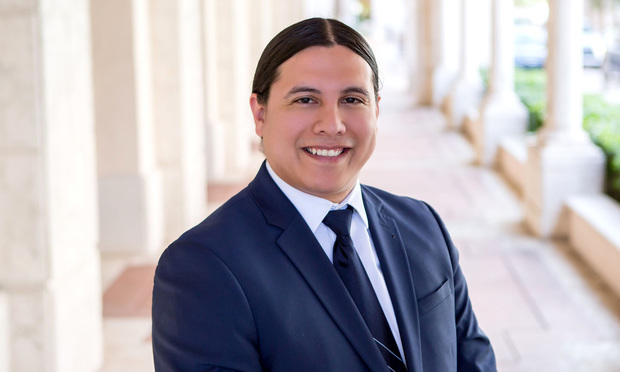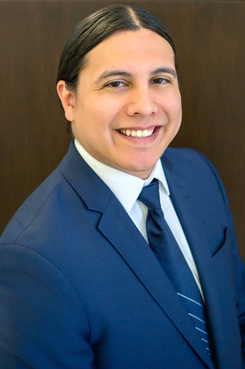How Miami Attorney Curtis Osceola's 'Crazy Plan' Made Him the Miccosukee Tribe's First Lawyer
Curtis Osceola, of the Moskowitz Law Firm in Coral Gables, implemented a "crazy plan" to become the first attorney from the Miccosukee Tribe of Indians of Florida.
June 14, 2019 at 03:44 PM
7 minute read
 Curtis E. Osceola, associate with The Moskowitz Law Firm. Courtesy photo.
Curtis E. Osceola, associate with The Moskowitz Law Firm. Courtesy photo.
As an 18-year-old college dropout in 2007, Curtis Osceola felt stuck. School hadn't lived up to the hype, his parents were on the brink of a divorce and he'd ended up with probation and drug counseling after getting caught with marijuana.
Osceola thought back to his childhood years with Garrett Anderson at the Miccosukee Tribe of Indians of Florida, and how former chairman and leading medicine man Sonny Billie would tell other kids they “should all be like Garrett and Curtis” — cousins who loved each other like brothers.
Though teenage life took them different ways, Osceola had no idea that when Anderson called last Thanksgiving it would be the last time.
“[Anderson] was saying, 'What? Are you crazy? You should be in school. You're smart. You should be a lawyer or something,'” Osceola said. “He was like, 'I've got to ride bulls, that's what I've got to do. But you're smart, you should be in college.'”
Two months later, on Jan. 20, 2008, Osceola's phone rang again. Anderson had died of an opioid overdose. Until then, Osceola hadn't really thought much about the future. Now it was staring him down.
“I was at a real crossroads in my life,” Osceola said.
Instead of letting his arrest be a hindrance, Osceola made it a “learning exercise.” He started working with the Miccosukee health clinic, and in April 2009, he made a “crazy plan.” In 10 years, he'd be a lawyer.
“I wanted more,” Osceola said. “I wanted to help the Miccosukee government. I wanted to help my people.”
Osceola started with business school, studying finance at Nova Southeastern University until his grades could take him to the University of Miami. There, he headed a business development project in Overtown, helping local companies improve their accounting, marketing or sales practices.
Degree in hand, Osceola swapped his internship at the Miccosukee chairman's office for a full-time position with its resort and gaming facility. His mission as a business analyst: find out how they were losing money and figure out how to stop it.
Aside from saving the tribe millions by adjusting inefficient practices, Osceola said he uncovered a massive internal fraud scheme and, suddenly, the slot department was several employees light. The slot director also had to go, though he hadn't been involved with the fraud, Osceola said. Before Osceola knew it, he was saying yes to then-Miccosukee Chairman Colley Billie, who asked him to take over the department — the tribe's largest organizational body, with about 140 employees.
“Boy, that was quite the undertaking,” Osceola said. “I inherited a dysfunctional department that had just lost a number of staff to this fraud, so we had to rebuild from square one.”
Osceola created new auditing procedures for all the games and machines, implementing new accounting practices and reorganizing staff. But in the meantime, he had gotten into the University of Miami School of Law.
“Because I had that 10-year plan, remember that? So I had to keep that going,” he said.
When semester one rolled around, Osceola was still working full time. It didn't go well.
“Of course, I'm not sleeping very much, I'm working too hard, I'm not reading enough for my classes,” Osceola said. “That was a bad idea.”
Osceola hired his replacement and resigned in time for second semester, when his grades soared. But thanks to that shaky first semester, Osceola had no job offers in his final year — until UM professor Sergio Campos told nationally-lauded civil litigator Adam Moskowitz about his work as a research assistant.
“I said, 'He's hired.' I didn't even need to meet him, because I really trust Sergio Campos and he gave him a glowing recommendation,” Moskowitz said.
After hiring Osceola for the summer, Moskowitz took him on permanently at the Moskowitz Law Firm. As the first Miccosukee Indian to become a lawyer, Osceola is representing his tribe in class action lawsuits against Big Pharma over the opioid crisis, which has devastated many Native American communities.
“In 25 years of practicing law, I've never seen a young attorney have such passion and dedication towards a cause as he does,” Moskowitz said. “I think someday he may even be the head of his tribe.”
Osceola also held a UM legal clinic with Chris Ajizian of Isicoff Ragatz in June, aimed at providing legal services to Miami's homeless addicts.
The Osceola legacy
As a child, Osceola says he got the best of both worlds, growing up in Naples but still getting doses of Miccosukee's quiet, slow, measured lifestyle.
“Miccosukee is a beautiful place,” Osceola said. “We talk for a long time and we think for a long time. There's a lot of silence and peace to that.”
 Curtis E. Osceola. Courtesy photo.
Curtis E. Osceola. Courtesy photo.Osceola's father shares his name — as did his father, who was a prominent tribal leader in the 1950s. At that time, then-President Dwight Eisenhower led a doomed campaign to assimilate Native American tribes into U.S. society through policies aimed at ending government services to Indian tribes.
Before the Miccosukees were federally recognized, Osceola's grandfather testified to Congress through a letter, saying he hoped his people could cooperate with the government, get educated and become leaders, doctors — lawyers.
The Osceola name also stems from a famed war chief who fought against the U.S. government in the Second Seminole War. He studied in French military school, then applied his knowledge to the Seminole battlefield.
“I like to think that's what I did as well,” Osceola said. “I learned about the law to protect my people. What I wanted to do was become an advocate so that we would not be at the mercy of the court, we would not be at the mercy of congress, but that we could stand against any oppressive acts that seek to diminish tribal sovereignty.”
In elementary school, Osceola thought he “didn't fit the mold,” uninterested in the curriculum and homework. But his mother, a school teacher, realized Osceola's learning style was different to his classmates, helping him transfer to another school's gifted program.
Osceola regularly addresses Miccosukee schoolkids, many of whom he says are “wise beyond their years,” having been through so much.
“I'm like, 'Hey, here's a peek. Take a look at what's going on out there,'” Osceola said. “I don't want them to be afraid of the world. I don't want them to think that they can't do it or that they can't function at a high level. Because even though I'm the first Miccosukee to become a lawyer, I can't be the last.”
As keynote speaker at this year's graduation ceremony, Osceola encouraged students to be the best mechanics, teachers, politicians, parents or lawyers they could be. And if they failed, he told them, their family and community would be there to pick them up in time for their next challenge.
Now working on a still-emerging 30-year plan, Osceola's civil litigation work will be the genesis.
Curtis Osceola
Born: August 1989, Kendall
Spouse: Jennifer Veiga
Education: University of Miami, J.D., 2018; University of Miami, B.B.A., 2014
Experience: Associate attorney, The Moskowitz Law Firm, 2018-present; Research assistant to professor Sergio J. Campos, University of Miami School of Law, August 2017-February 2019; Judicial intern for U.S. Court of Federal Claims Judge Victor J. Wolski, May 2017-August 2017; Slot director, Miccosukee Resort and Gaming, May 2015–October 2015; Business Analyst, Miccosukee Tribe of Indians of Florida, June 2014–May 2015
More profile stories:
After the Massacre: Fired by Nixon, Miami Lawyer Jon Sale Rose to Prominence
This content has been archived. It is available through our partners, LexisNexis® and Bloomberg Law.
To view this content, please continue to their sites.
Not a Lexis Subscriber?
Subscribe Now
Not a Bloomberg Law Subscriber?
Subscribe Now
NOT FOR REPRINT
© 2025 ALM Global, LLC, All Rights Reserved. Request academic re-use from www.copyright.com. All other uses, submit a request to [email protected]. For more information visit Asset & Logo Licensing.
You Might Like
View All
Local Boutique Expands Significantly, Hiring Litigator Who Won $63M Verdict Against City of Miami Commissioner
3 minute read
Greenberg Traurig Combines Digital Infrastructure and Real Estate Groups, Anticipating Uptick in Demand
4 minute read
US Judge Cannon Blocks DOJ From Releasing Final Report in Trump Documents Probe
3 minute read
Plaintiffs Allege Carollo Retaliated Over Bayfront Trust Accounting Discoveries
3 minute readTrending Stories
- 1Pogo Stick Maker Wants Financing Company to Pay $20M After Bailing Out Client
- 2Goldman Sachs Secures Dismissal of Celebrity Manager's Lawsuit Over Failed Deal
- 3Trump Moves to Withdraw Applications to Halt Now-Completed Sentencing
- 4Trump's RTO Mandate May Have Some Gov't Lawyers Polishing Their Resumes
- 5A Judge Is Raising Questions About Docket Rotation
Who Got The Work
J. Brugh Lower of Gibbons has entered an appearance for industrial equipment supplier Devco Corporation in a pending trademark infringement lawsuit. The suit, accusing the defendant of selling knock-off Graco products, was filed Dec. 18 in New Jersey District Court by Rivkin Radler on behalf of Graco Inc. and Graco Minnesota. The case, assigned to U.S. District Judge Zahid N. Quraishi, is 3:24-cv-11294, Graco Inc. et al v. Devco Corporation.
Who Got The Work
Rebecca Maller-Stein and Kent A. Yalowitz of Arnold & Porter Kaye Scholer have entered their appearances for Hanaco Venture Capital and its executives, Lior Prosor and David Frankel, in a pending securities lawsuit. The action, filed on Dec. 24 in New York Southern District Court by Zell, Aron & Co. on behalf of Goldeneye Advisors, accuses the defendants of negligently and fraudulently managing the plaintiff's $1 million investment. The case, assigned to U.S. District Judge Vernon S. Broderick, is 1:24-cv-09918, Goldeneye Advisors, LLC v. Hanaco Venture Capital, Ltd. et al.
Who Got The Work
Attorneys from A&O Shearman has stepped in as defense counsel for Toronto-Dominion Bank and other defendants in a pending securities class action. The suit, filed Dec. 11 in New York Southern District Court by Bleichmar Fonti & Auld, accuses the defendants of concealing the bank's 'pervasive' deficiencies in regards to its compliance with the Bank Secrecy Act and the quality of its anti-money laundering controls. The case, assigned to U.S. District Judge Arun Subramanian, is 1:24-cv-09445, Gonzalez v. The Toronto-Dominion Bank et al.
Who Got The Work
Crown Castle International, a Pennsylvania company providing shared communications infrastructure, has turned to Luke D. Wolf of Gordon Rees Scully Mansukhani to fend off a pending breach-of-contract lawsuit. The court action, filed Nov. 25 in Michigan Eastern District Court by Hooper Hathaway PC on behalf of The Town Residences LLC, accuses Crown Castle of failing to transfer approximately $30,000 in utility payments from T-Mobile in breach of a roof-top lease and assignment agreement. The case, assigned to U.S. District Judge Susan K. Declercq, is 2:24-cv-13131, The Town Residences LLC v. T-Mobile US, Inc. et al.
Who Got The Work
Wilfred P. Coronato and Daniel M. Schwartz of McCarter & English have stepped in as defense counsel to Electrolux Home Products Inc. in a pending product liability lawsuit. The court action, filed Nov. 26 in New York Eastern District Court by Poulos Lopiccolo PC and Nagel Rice LLP on behalf of David Stern, alleges that the defendant's refrigerators’ drawers and shelving repeatedly break and fall apart within months after purchase. The case, assigned to U.S. District Judge Joan M. Azrack, is 2:24-cv-08204, Stern v. Electrolux Home Products, Inc.
Featured Firms
Law Offices of Gary Martin Hays & Associates, P.C.
(470) 294-1674
Law Offices of Mark E. Salomone
(857) 444-6468
Smith & Hassler
(713) 739-1250






